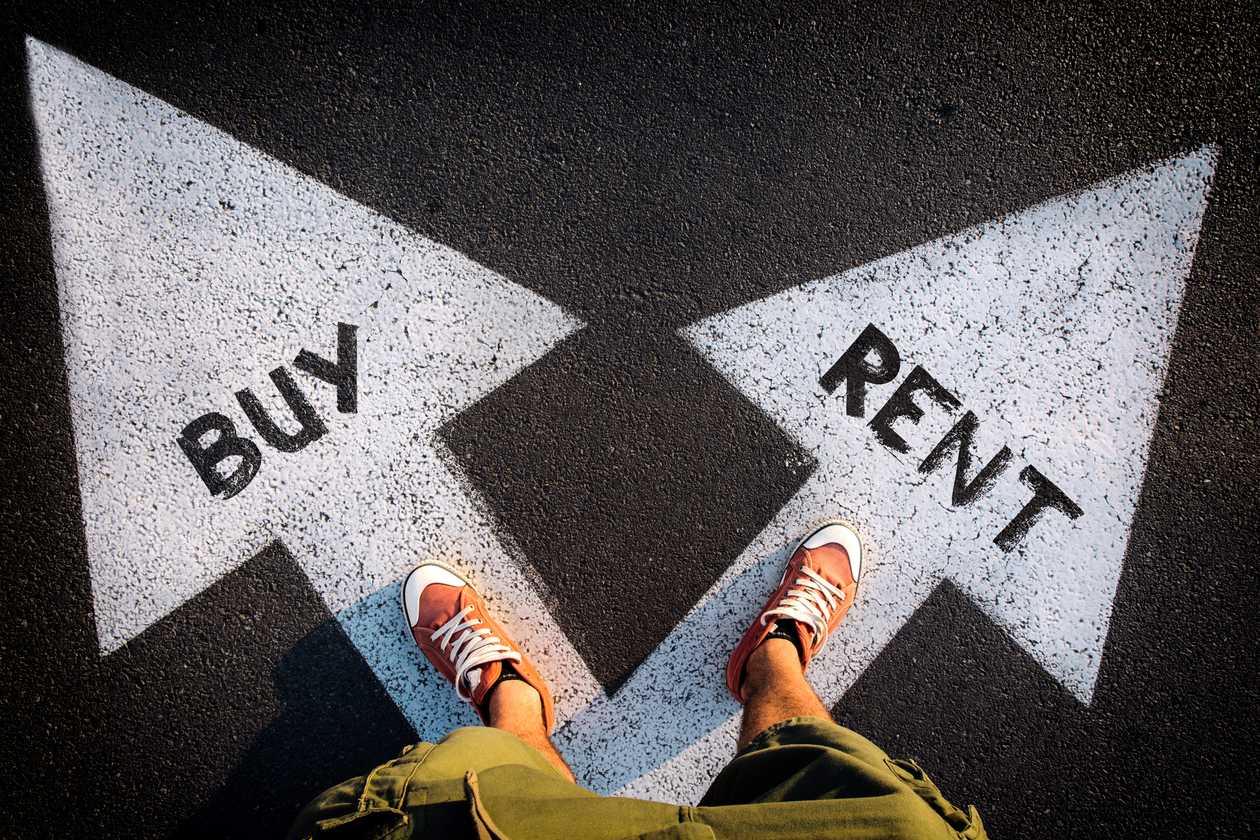
To some, the dream of homeownership symbolizes stability, household life and an abode they will make their very own. To others, renting means freedom to roam and passing over upkeep and restore duties to another person. There isn’t any proper reply, however there’s a proper reply for you.
Renting vs. shopping for a house: Key variations
So is renting or shopping for higher? Whereas it largely boils right down to funds and affordability, private targets and selection, preferences, and life-style, there are key variations between renting and shopping for a house. Let’s have a look.
|
|
|
|
|
Renting
What are the downsides to renting?
- Not constructing fairness. Whenever you lease, you might be spending cash on one thing that is not serving to you construct fairness, and also you gained’t personal the house outright someday.
- Lease worth is not fastened. Your lease funds are topic to extend. When you dwell in a rent-controlled constructing, there is a cap as to how a lot your lease can go up every year. That being stated, in contrast to whenever you personal your property, your landlord has the facility to bump up your lease.
- Repairs and maintenance are out of your fingers. Do you have to undergo a leaky faucet or mildew in your toilet ceiling, you could have to attend to your landlord or property administration firm to take motion and make the repairs. Moreover, the structural situation and normal look of your rental unit and constructing are on the mercy of your landlord.
- No tax advantages. You will not get to get pleasure from any tax advantages by renting.
- Restrictions on modifications. As a result of it isn’t your property, there are limits as to what you possibly can and might’t change in your house. For example, you would possibly be capable to paint the partitions, and dangle work, however you will primarily want to go away the place in the identical situation you discovered it in.
- Probably no pets allowed. When you’re a pet lover and pet guardian, you may need a tougher time discovering a spot to lease together with your cat or chinchilla. Not all leases enable pets.
Listed here are some benefits to renting:
- It’s typically cheaper. Your month-to-month lease cost could also be kind of than a mortgage cost, however you gained’t be on the hook for upkeep, repairs and maintenance.
- Freedom and suppleness. Whereas with a house you would possibly really feel tethered to a everlasting house, you possibly can extra simply uproot and transfer to new stomping grounds, as quickly as your lease is up. In case your monetary scenario modifications, you possibly can downsize to a smaller house to save cash. That’s tougher to do whenever you personal a house.
- No down cost. Whenever you transfer to a brand new house, apart from your deposit, you are not required to pony up a down cost or closing prices.
Proudly owning
Listed here are some downsides to homeownership:
- Excessive upfront prices. If you wish to be a house owner, until you’ve gotten the funds to pay for it outright, you will must have sufficient to save lots of for a down cost and shutting prices. The minimal down cost depends upon the kind of mortgage. For example, the minimal down cost for a Federal Housing Administration mortgage is 3.5% of the entire mortgage quantity.
- Insurance coverage and taxes. Homeownership means paying insurance coverage and taxes. Whereas the precise price ticket depends upon elements akin to location, housing, and protection, the common owners insurance coverage coverage within the U.S. is $1,899 with $300,000 dwelling protection (based on PolicyGenius). You are on the hook for personal mortgage insurance coverage for those who put lower than 20% down on a traditional mortgage.
- Upkeep and repairs. Whenever you personal a house, sustaining your abode falls solely in your fingers. How a lot you will want to take a position to take care of your property depends upon its situation.
- Depreciation. When you don’t spend cash to take care of your property, there an opportunity the worth of your property gained’t recognize over time.
Listed here are some professionals to homeownership:
- Mounted month-to-month funds. If in case you have a set fee mortgage, your funds would be the similar all through the lifetime of your mortgage.
- Tax advantages. Homeownership comes with some tax breaks together with breaks in your mortgage curiosity and property taxes.
- You construct fairness. As you repay your property mortgage, your fairness in your home will increase. That is fairness you possibly can money out on whenever you promote or do a cash-out refinance. It’s also possible to faucet into your property’s fairness with a house fairness mortgage or residence fairness line of credit score (HELOC).
- Tailor it to your liking. Since you personal your abode, you possibly can modify it, renovate to your style, and even demolish and rebuild if you wish to.
To lease or purchase: How you can determine which is best for you
Listed here are some questions you will need to ask your self to determine whether or not renting or shopping for is best for you.
- What’s your month-to-month price range for housing?
- How do you’re feeling a few long-term funding?
- What are an important options and facilities in a house?
- How lengthy do you intend to remain within the residence? Is it kind of than 5 years?
- Would you like a extra everlasting, fastened scenario, or a extra versatile one?
- Are you able to afford to restore and preserve a house?
- What are your short-term and long-term private, skilled, and monetary targets?
- The place do you need to dwell? Is the neighborhood a spot you possibly can afford to purchase?
Which is more cost effective, renting or shopping for?
Let’s say you’ve gotten two choices on the identical place: you possibly can both purchase it from the present proprietor or lease it. To determine whether or not shopping for or renting is more cost effective, you could possibly take a look at what your month-to-month mortgage cost will probably be plus a set estimate of your yearly upkeep prices and taxes and examine that to what you’d pay in lease. In case your lease is under your possession prices, and you could possibly make investments the distinction in shares and bonds, it would make extra sense to lease. However, if the properties within the space you’re buying in are more likely to recognize considerably, it would make extra sense to purchase.
Whereas there are distinct benefits and disadvantages to each renting versus shopping for, the choice largely boils right down to your monetary scenario, preferences, life-style, and private {and professional} targets. It is also a good suggestion to see which is more cost effective and when it makes extra monetary sense to purchase versus lease, and vice versa.
Often requested questions (FAQs)
How can I lower your expenses to purchase a home whereas paying for lease?
First, you will need to zero in on roughly how a lot you will need to save for a down cost. To save lots of to purchase a home whereas juggling lease funds, bolster your revenue by taking over aspect gigs, taking over extra work at your day job, and seeing for those who qualify for time beyond regulation. See if there’s any manner you qualify for a bonus or promotion.
It’s also possible to save by slicing again on the three main bills—meals, housing, and transportation. For example, transfer to a extra reasonably priced neighborhood, get a roommate, eat out and get much less meals supply.
Is it a very good monetary determination to pay greater than 30% of my revenue on lease?
It is a normal rule of thumb to spend not more than 30% of your gross revenue (aka revenue earlier than taxes and different deductions) in your housing. That being stated, it isn’t a hard-and-fast rule.
For example, for those who dwell in a dearer a part of the nation, like in New York Metropolis or San Francisco, you would possibly end up spending upward of fifty% of your revenue towards lease. However for those who’re in additional reasonably priced stomping grounds, then 15% of your revenue is perhaps extra the norm. The primary factor is to maintain your housing reasonably priced so it does not eat up an excessive amount of of your money movement.
What’s the common down cost on a home?
The common down cost for a home is 20%, although there are some exceptions. For instance, if in case you have an FHA mortgage or veteran’s residence mortgage, you could possibly put down 10% or much less.
What are present mortgage charges?
Between 2008 and 2020, mortgage charges had been usually between 4% and 6%. Through the pandemic, rates of interest plummeted, however since spring of 2022, they’ve crept as much as ranges not seen because the George W. Bush administration. Now they’re within the vary of 5% to 7%. Charges change typically, so examine your native mortgage lender or use our instrument under to your finest present fee.
The data offered right here is created independently from the TIME editorial employees. To study extra, see our About web page.
